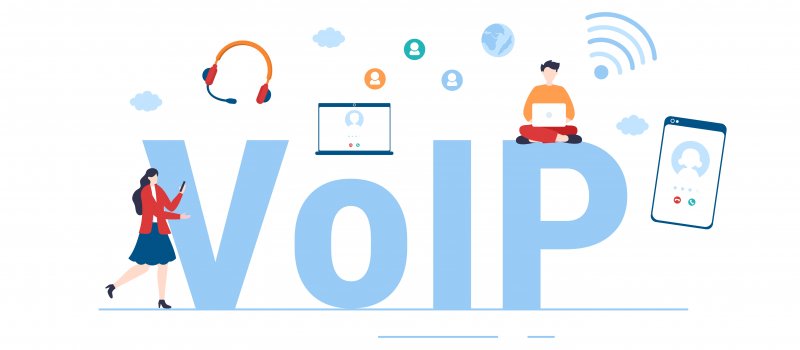Is your business switching from an analog phone system to VoIP (Voice over Internet Protocol)? IP-based phones offer compelling advantages, making them a good fit for most businesses today. However, you’ll need the right hardware. Here’s a look at the VoIP equipment you should consider when making the switch.
VoIP vs. Landline Phones – What You Need to Make Calls
With an analog phone system, you plug your landline phones into a phone jack. Sound is transmitted via electrical pulses transmitted through copper wires, and calls are made over the public switched telephone network.
If your business still uses landline phones, you probably use an on-premises Private Branch Exchange (PBX) system. With a PBX, your phone company configures an internal phone network, which essentially connects your employees on a shared phone system, so you don’t require multiple phone lines.
When you have a VoIP phone system, call data is sent over the internet. You can use your existing internet connection for phone calls. Your employees can make and receive phone calls as long as they have an internet connection; they don’t have to be in the office calling from a landline phone that’s plugged into a telephone outlet and connected to trenched and laid wires.
Internet-based phone systems are also more reliable. Because calls rely on the internet, voice data is sent faster. There are also no worries about poor call quality (or extra costs) with long-distance calls. Also, because your provider manages and maintains the network, the hardware, and the software, you don’t need in-house IT resources to ensure you have a smooth-functioning phone system.
VoIP – What Equipment Do You Need?
For a VoIP phone system to work, you have to have a modem and router, which are part of your existing internet setup. Users make calls from any device that has your call software downloaded. This device can be a smartphone, laptop, or desktop. You can also make calls from a VoIP phone.
Employees can call from anywhere, whether they’re calling from their device or a VoIP phone, enabling your remote teams to stay productive and connected as they work from wherever.
As long as you already have a high-quality internet connection for your business, you don’t have to invest in a lot of telephony equipment to get started with a VoIP phone system for your business. Here are some of the type of equipment you can consider:
VoIP desktop phones
VoIP phones are designed to work with IP technologies for transmitting calls. They are wireless phones that don’t need to be connected to an outlet in the way that a landline phone would, although they can have all the same features you’d find on a business phone such as functions for conference calling, do not disturb, and call waiting.
Your employees can use these phones at the office or at home if they work remotely. There’s no complicated setup process, so you can start using them right away.
VoIP Headsets
Another optional type of VoIP equipment to consider is a headset. With a headset, employees can talk comfortably without having to hold up a phone or rely on the audio from their computer.
Do You Need a Special Modem or Router to Make VoIP Calls?
No, your business doesn’t need to purchase a new modem or router. Once your VoIP application is downloaded on your device, you can make and receive calls from that device. If your business’s internet connection isn’t robust enough, however, you may want to consider upgrading to ensure you have enough bandwidth.
Can You Make VoIP Calls with Your Regular Phone?
With SIP Trunking, you can use your existing on-premises business phone system and still gain the flexibility, call quality, and cost savings offered by internet-based calls. Businesses who modernize their phone system with SIP Trunking can cut costs by up to 50 percent.
With this technology, phone calls are routed over the internet instead of copper wires. As a result, you’ll no longer need to work with a traditional phone company. If your phone system is compatible with SIP Trunking, you won’t need any extra equipment. If you have an older phone system, you may need a VoIP Gateway, which is a special device that translates analog and digital calls into VoIP calls.
Is VoIP the Same Thing as UCaaS?
UCaaS uses VoIP technology, but it also encompasses additional tools on top of IP-based calls. With UCaaS, making voice calls over the internet is only one of several integrated communication and collaboration tools your teams can use. Unified communications unites business phone services with team chat, video conferencing, and file management.
Calls are made over the internet, so you aren’t using traditional landline phones. And, you can still experience the advantages of a PBX phone system for businesses. With hosted PBX, your business connects to a cloud-based PBX network, and your provider handles all the hardware, maintenance, security, and upgrades.
Intermedia Unite offers reliable, secure, all-in-one communications for businesses of all sizes. You can purchase new VoIP phones for your employees or use your existing phones. Your teams can also communicate through their mobile device or laptop. Essentially, everyone at your company can communicate how they want, from wherever they are. Contact us today and learn more about how easy it is to set up and use VoIP phones and unified communications for your business.
February 23, 2022
Explore other posts on these topics: Moving to the Cloud Unified Communications





